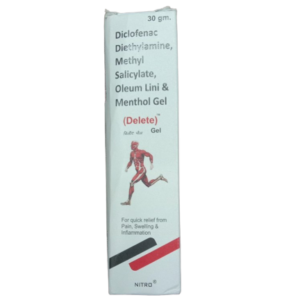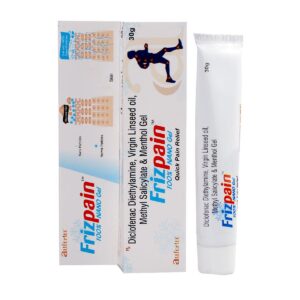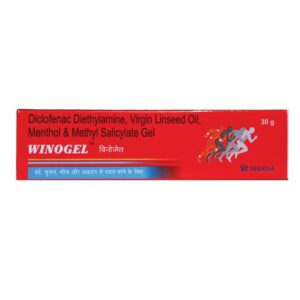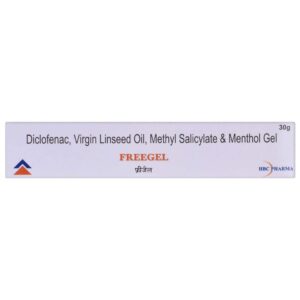DICLOFENAC + LINSEED OIL + MENTHOL + METHYL SALICYLATE
Diclofenac: Diclofenac is a nonsteroidal anti-inflammatory drug (NSAID) that is commonly used to relieve pain and reduce inflammation in conditions such as arthritis, joint pain, and acute injuries. It is available in various forms, including oral tablets, capsules, topical gels, patches, and injections.
The mechanism of action of diclofenac involves inhibiting the production of prostaglandins, which are chemicals that contribute to pain and inflammation. By blocking the enzymes responsible for prostaglandin synthesis (cyclooxygenase-1 and cyclooxygenase-2), diclofenac helps to reduce pain, swelling, and fever associated with inflammatory conditions.
The recommended dose of diclofenac can vary depending on the route of administration and the condition being treated. Oral diclofenac is usually taken with food to minimize stomach upset. Typical doses for acute pain or inflammation range from 50 to 150 mg per day, divided into two or three doses. The sustained-release form may be taken once daily. It is important to follow the prescribed dosage and duration as directed by your healthcare provider.
Like other NSAIDs, diclofenac can potentially cause side effects. Common side effects include stomach upset, heartburn, nausea, and diarrhea. In rare cases, it may also cause more serious side effects such as stomach ulcers, bleeding, kidney problems, and cardiovascular events (e.g., heart attack, stroke). These risks are higher in people with a history of ulcers, high blood pressure, heart disease, and kidney problems. It is important to discuss any existing medical conditions and medications with your doctor before starting diclofenac.
Diclofenac is not recommended for individuals who are allergic to NSAIDs, have a history of asthma attacks or severe allergic reactions after taking NSAIDs, or are in the third trimester of pregnancy. It is also important to be cautious if you have a history of gastrointestinal bleeding, liver or kidney disease, or are taking blood thinners.
In summary, diclofenac is a commonly used NSAID that helps relieve pain and inflammation. It works by inhibiting the production of prostaglandins. However, like any medication, diclofenac may have side effects, and it is important to use it under the guidance of a healthcare professional and follow the prescribed dosage.
Linseed Oil: Linseed oil is a fatty substance derived from the seeds of the flax plant (Linum usitatissimum). It is commonly used as a dietary supplement and is also found in some cosmetic and industrial products.
The primary use of linseed oil is as a nutritional supplement due to its high content of omega-3 fatty acids, specifically alpha-linolenic acid (ALA). Omega-3 fatty acids are essential nutrients that the body cannot produce on its own and are crucial for maintaining overall health. They play a vital role in reducing inflammation, supporting heart health, promoting brain function, and improving skin health.
The mechanism of action of linseed oil is attributed to its omega-3 fatty acid content. ALA is converted into eicosapentaenoic acid (EPA) and docosahexaenoic acid (DHA) in the body. These fatty acids have anti-inflammatory properties and can modulate various physiological processes.
There is no specific recommended dose for linseed oil as it may vary depending on the individual’s age, health condition, and intended use. As a dietary supplement, it is typically available in capsule or liquid form. It is advised to follow the dosage instructions provided by the manufacturer or consult with a healthcare professional.
Linseed oil is generally safe for most people when used as a dietary supplement. However, some individuals may experience mild side effects, including gastrointestinal issues such as diarrhea or bloating. Allergic reactions are rare but possible. It is important to note that linseed oil should not be used as a substitute for prescribed medication without medical supervision.
It is advisable to consult with a healthcare professional, especially if you have any underlying health conditions, are pregnant or breastfeeding, or are taking other medications, before starting linseed oil supplementation. They can provide personalized recommendations and guide you on the appropriate use and dosage.
Menthol: Menthol is a natural compound derived from mint plants, primarily peppermint and spearmint. It is commonly used in various over-the-counter products due to its cooling sensation and soothing properties.
Menthol has multiple uses and is found in many products such as topical analgesics, cough drops, throat lozenges, and lip balms. It is known for its ability to relieve minor aches and pains, soothe sore throats, alleviate itching and irritation, and provide a cooling effect on the skin.
The mechanism of action of menthol involves interaction with specific sensory receptors in the body. It binds to and activates the transient receptor potential (TRP) channels, particularly TRPM8, which are involved in the perception of cold and pain. By stimulating these receptors, menthol produces a cooling and numbing sensation, which helps relieve discomfort.
The dose of menthol varies depending on the product and its intended use. Menthol creams and ointments typically contain a concentration of 1-16%. For throat lozenges and cough drops, menthol content can range from 5-15 mg per lozenge. It is important to follow the instructions provided by the specific product and consult a healthcare professional if unsure about the appropriate dose.
Menthol is generally considered safe when used as directed. However, some individuals may experience mild side effects. These can include skin irritation, burning sensation, or allergic reactions in sensitive individuals. Overuse or excessive application of menthol-containing topical products may lead to skin irritation or a feeling of intense cold. Ingesting excessive amounts of menthol lozenges or cough drops can cause nausea, vomiting, or diarrhea.
It is worth noting that menthol is not recommended for use in children below the age of two, as it may cause irritation or an adverse reaction. Pregnant or breastfeeding individuals should also exercise caution and consult with a healthcare professional before using menthol-containing products.
As with any medication, it is advisable to read and follow the instructions on the product label, and if any concerning side effects occur, consult a healthcare professional.
Methyl Salicylate: Methyl salicylate is a drug that is commonly used as a topical analgesic and rubefacient. It is commonly found in medications such as muscle rub creams and liniments.
Mechanism of Action:
Methyl salicylate works by dilating the blood vessels in the skin, which helps to relieve pain and reduce inflammation. It also has a counterirritant effect, where it produces a cooling and warming sensation on the skin, which can help distract from pain.
Use:
Methyl salicylate is primarily used to provide temporary relief from minor aches and pains of muscles and joints, including sprains, strains, and arthritis. It is usually applied topically to the affected area and can be massaged into the skin for better absorption.
Dose:
The dose of methyl salicylate varies depending on the specific product being used. It is important to carefully read and follow the instructions on the label or consult a healthcare professional for appropriate dosage guidance. Generally, a thin layer should be applied to the affected area and massaged until completely absorbed, usually 3 to 4 times a day. It is important not to exceed the recommended dosage.
Side Effects:
While methyl salicylate is generally safe when used as directed, there are some potential side effects that may occur. Common side effects include skin irritation, redness, and a burning or warming sensation at the application site. In rare cases, individuals may experience an allergic reaction characterized by rash, itching, swelling, dizziness, or difficulty breathing. Consult a healthcare professional if any severe or persistent side effects occur.
It is important to note that methyl salicylate should not be ingested or applied to broken skin, as it can be absorbed into the bloodstream and cause systemic side effects or toxicity. It should also be used with caution in children and pregnant or breastfeeding women, as the safety in these populations may not be well-established.





